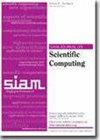Multigrid-Augmented Deep Learning Preconditioners for the Helmholtz Equation Using Compact Implicit Layers
IF 2.6
2区 数学
Q1 MATHEMATICS, APPLIED
引用次数: 0
Abstract
SIAM Journal on Scientific Computing, Ahead of Print.Abstract. We present a deep learning–based iterative approach to solve the discrete heterogeneous Helmholtz equation for high wavenumbers. Combining classical iterative multigrid solvers and convolutional neural networks (CNNs) via preconditioning, we obtain a faster, learned neural solver that scales better than a standard multigrid solver. Our approach offers three main contributions over previous neural methods of this kind. First, we construct a multilevel U-Net-like encoder-solver CNN with an implicit layer on the coarsest grid of the U-Net, where convolution kernels are inverted. This alleviates the field of view problem in CNNs and allows better scalability. Second, we improve upon the previous CNN preconditioner in terms of the number of parameters, computation time, and convergence rates. Third, we propose a multiscale training approach that enables the network to scale to problems of previously unseen dimensions while still maintaining a reasonable training procedure. Our encoder-solver architecture can be used to generalize over different slowness models of various difficulties and is efficient at solving for many right-hand sides per slowness model. We demonstrate the benefits of our novel architecture with numerical experiments on various heterogeneous two-dimensional problems at high wavenumbers.
使用紧凑内隐层的亥姆霍兹方程多网格增强深度学习预处理器
SIAM 科学计算期刊》,提前印刷。 摘要我们提出了一种基于深度学习的迭代方法,用于求解高波数的离散异质亥姆霍兹方程。通过预处理将经典迭代多网格求解器与卷积神经网络(CNN)相结合,我们获得了一种更快的学习神经求解器,其扩展性优于标准多网格求解器。与之前的同类神经方法相比,我们的方法有三大贡献。首先,我们构建了一个类似 U-Net 的多层次编码器求解 CNN,在 U-Net 的最粗网格上有一个隐含层,其中的卷积核是反转的。这缓解了 CNN 的视场问题,使其具有更好的可扩展性。其次,我们在参数数量、计算时间和收敛率方面改进了之前的 CNN 预处理。第三,我们提出了一种多尺度训练方法,使网络能够扩展到以前从未见过的维度问题,同时仍然保持合理的训练程序。我们的编码器-求解器架构可用于泛化不同难度的慢度模型,并能高效地求解每个慢度模型的多个右手边。我们通过对高波数下各种异质二维问题的数值实验,证明了我们的新架构的优势。
本文章由计算机程序翻译,如有差异,请以英文原文为准。
求助全文
约1分钟内获得全文
求助全文
来源期刊
CiteScore
5.50
自引率
3.20%
发文量
209
审稿时长
1 months
期刊介绍:
The purpose of SIAM Journal on Scientific Computing (SISC) is to advance computational methods for solving scientific and engineering problems.
SISC papers are classified into three categories:
1. Methods and Algorithms for Scientific Computing: Papers in this category may include theoretical analysis, provided that the relevance to applications in science and engineering is demonstrated. They should contain meaningful computational results and theoretical results or strong heuristics supporting the performance of new algorithms.
2. Computational Methods in Science and Engineering: Papers in this section will typically describe novel methodologies for solving a specific problem in computational science or engineering. They should contain enough information about the application to orient other computational scientists but should omit details of interest mainly to the applications specialist.
3. Software and High-Performance Computing: Papers in this category should concern the novel design and development of computational methods and high-quality software, parallel algorithms, high-performance computing issues, new architectures, data analysis, or visualization. The primary focus should be on computational methods that have potentially large impact for an important class of scientific or engineering problems.

 求助内容:
求助内容: 应助结果提醒方式:
应助结果提醒方式:


